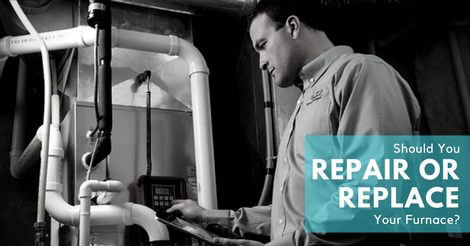Should You Repair or Replace Your Furnace?

It happens eventually in every home. On a particularly cold winter day, you turn up the thermostat, but there is no response: No sound of the system switching on and no warm air blowing through the vents. Hopefully, it is a simple problem that can be solved quickly and inexpensively. But, what if the repair is so big and costly it raises that age-old question: Is it more cost effective to fix what you have or replace it?
No doubt, this is a challenging decision to make from both a comfort and financial perspective, as repair costs can range significantly. It is not easy to know whether you should repair or replace your home’s heating system, especially if you are facing an emergency situation.
When to Repair Your Furnace
Routine annual maintenance is the number one way to extend the life of your system. When equipment is maintained on a consistent basis the more likely small problems can be detected and repaired early before they turn into major problems.
Repair is likely your best option when your system fits the criteria below:
Age. If your furnace is less than 12 years old, repair is generally your best option.
Covered Under Warranty. If the system is still under a manufacturer’s warranty or service contract that covers the failed part and/or labor repairing is the smarter choice.
Repair Cost. If your furnace is less than 12 years old and the repair cost is less than 1/3 of the cost of a new system, repairing is the better choice.
Energy Efficiency. A major sign that your system is not operating efficiently is an increase in your energy bill. Another sign is if your home never seems to be at a comfortable temperature no matter how many times you adjust the thermostat. If you are not facing either of these problems, your system is most likely operating efficiently and repairing is the better option.
When to Replace Your Furnace
Of course, the cost of a new system is a major factor when choosing to replace your old one. However, if you consider your new furnace as an investment and look at how much money it can save you, in the long run, you’ll see that the benefits outweigh the cost.
If you are thinking about replacing your furnace consider the following:
Age. The average lifespan of a furnace is about 12 to 18 years. When the system reaches about 75% of its lifespan, it becomes less reliable and the parts are more difficult to find.
The Frequency of Repairs. If your system is constantly needing repair, it may be at the end of its life cycle.
Cost. If your furnace is over 12 years old and the repair cost is more than 1/3 of the cost of a new system, replacement is the better choice.
Long term plans. If you plan to stay at your home for several more years, consider upgrading to a more efficient system.
Your AC system uses R-22. This refrigerant is also known as Freon is harmful to the environment and is slowly being phased out. In a few years, R-410A will be the refrigerant of choice. R-22 will be difficult to obtain thus making it extremely expensive.
All newer system use R-410A and because it is a completely different refrigerant it can’t be mixed or used with existing AC or heat pumps that use R-22. When a new R-410A unit is installed both the outdoor and indoor coil need to be replaced. Therefore, it is generally more cost-effective and sometimes necessary to replace both the indoor and outdoor unit at the same time.
Whether you need to repair or replace your furnace, we have you covered. We also offer free installation estimates and financing on new systems. We are proud to be the best heating and cooling company in Emmaus, Allentown, Bethlehem, and surrounding areas!
